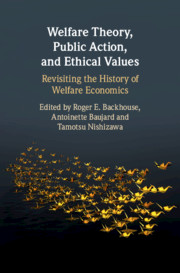Book contents
- Welfare Theory, Public Action, and Ethical Values
- Welfare Theory, Public Action, and Ethical Values
- Copyright page
- Contents
- Figures and Tables
- Contributors
- Acknowledgements
- Introduction: Revisiting the History of Welfare Economics
- Part I Plurality of Welfare in the Making of Welfare Economics
- 1 Ruskin’s Romantic Triangle
- 2 Radicalism versus Ruskin
- 3 Alfred Marshall on Progress and Human Wellbeing
- 4 Pigou’s Welfare Economics Revisited
- 5 To Which Kind of Welfare Did Léon Walras Refer?
- 6 Value Judgement within Pareto’s Economic and Sociological Approaches to Welfare
- Part II Developing Modern Welfare Economics
- Index
- References
5 - To Which Kind of Welfare Did Léon Walras Refer?
The Theorems and the State*
from Part I - Plurality of Welfare in the Making of Welfare Economics
Published online by Cambridge University Press: 04 March 2021
- Welfare Theory, Public Action, and Ethical Values
- Welfare Theory, Public Action, and Ethical Values
- Copyright page
- Contents
- Figures and Tables
- Contributors
- Acknowledgements
- Introduction: Revisiting the History of Welfare Economics
- Part I Plurality of Welfare in the Making of Welfare Economics
- 1 Ruskin’s Romantic Triangle
- 2 Radicalism versus Ruskin
- 3 Alfred Marshall on Progress and Human Wellbeing
- 4 Pigou’s Welfare Economics Revisited
- 5 To Which Kind of Welfare Did Léon Walras Refer?
- 6 Value Judgement within Pareto’s Economic and Sociological Approaches to Welfare
- Part II Developing Modern Welfare Economics
- Index
- References
Summary
Léon Walras is often assumed, at least implicitly, to be a welfarist on the grounds that his work is generally considered to be the origin of the first social welfare theorems and therefore a forerunner of Pareto optimality. This chapter argues that such a view contradicts the basic foundations of Walras’s economic and social philosophy and especially his conceptions of society and of individuals. If we take seriously Walras’s distinction between “general social conditions” (“conditions sociales générales”) and “specific personal positions” (“positions personnelles particulières”), we can develop an alternative interpretation of his views on welfare, which leads in turn to a different, non-welfarist, conception of the Walrasian view of the state.
Keywords
- Type
- Chapter
- Information
- Welfare Theory, Public Action, and Ethical ValuesRevisiting the History of Welfare Economics, pp. 118 - 134Publisher: Cambridge University PressPrint publication year: 2021

